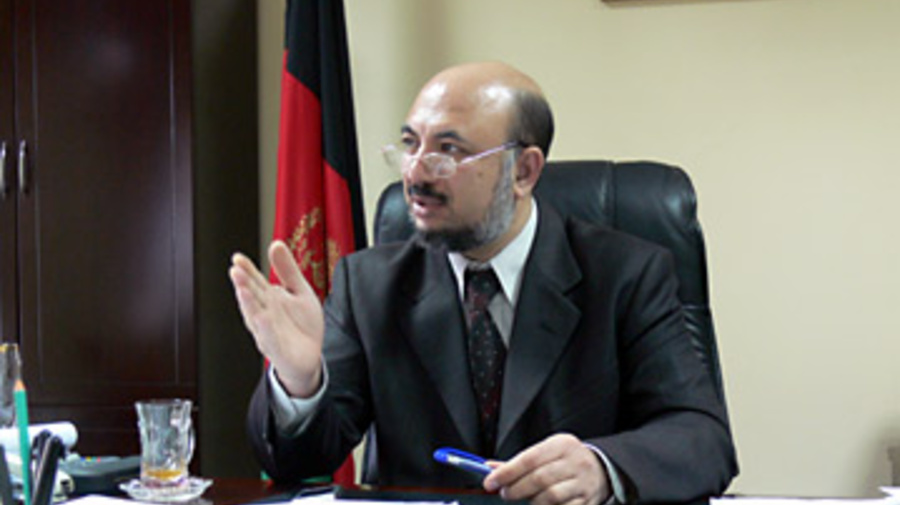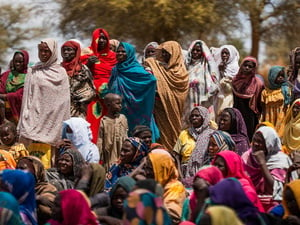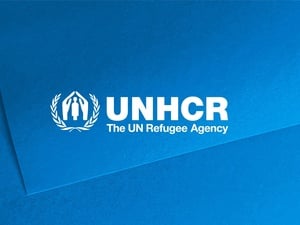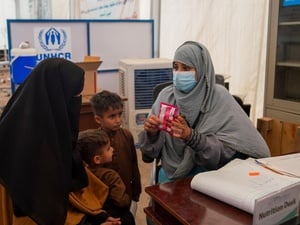Former UNHCR staffer leads Afghanistan's fight against illegal drugs
Former UNHCR staffer leads Afghanistan's fight against illegal drugs

Habibullah Qadiri, Afghanistan's Minister for Counter-Narcotics, and a former UNHCR employee, is leading Afghanistan's fight against opium cultivation.
KABUL, Afghanistan, Jan. 27 (UNHCR) - For a man with one of the toughest jobs in Afghanistan, and certainly one of its most closely scrutinized, Habibullah Qadiri has a relaxed manner that quickly puts visitors to his Kabul office at ease.
It may help that the visitor is from UNHCR, where Qadiri, now Afghanistan's Minister for Counter-Narcotics, worked for 12 years. But when he speaks of the challenges he faces in combating Afghanistan's opium production, as well as his views on the longer-term future of his country, it's clear that his optimism and affability come naturally.
"When I was working for the UN refugee agency I felt I was doing something truly worthwhile," says Qadiri who lived as a refugee in Pakistan for 16 years. "Through the agency I was serving my country. Today it's the same. I'm serving my country by ridding it of the scourge of drugs."
The fight against narcotics will be centre stage next Tuesday (Jan. 31) in London, when U.N. Secretary General Kofi Annan, Afghan President Hamid Karzai and world leaders gather to launch the Afghanistan Compact, setting out the country's political and economic plans for the next five years. "Counter-narcotics" is one of the four main areas addressed by the Compact, and Qadiri will be right there in the London conference centre for the discussions.
For Qadiri, who has been in the job for a little over a year, Afghanistan's poppy cultivation poses a threat to the country's continued recovery from decades of war.
"We have to spare no efforts in our fight against drugs and not allow their production to further tarnish the image of Afghanistan among the community of nations," he says.
The production of some 4,200 tonnes of raw opium in 2005 left Afghanistan holding the unwanted title of world's number one opium producer, the key ingredient used to manufacture heroin.
A report released at the end of last year by the United Nations Office on Drugs and Crime (UNODC) stated that the area of land being used for poppy cultivation in Afghanistan had dropped by some 20 per cent in 2005, but improved climatic conditions resulted in higher crop yields for farmers.
"In 2006 we will be working to further reduce the area of land being used to grow poppy with programmes aimed at the growers," says Qadiri. "But we'll also be going after the traffickers and those operating the laboratories that produce the heroin."
The country's domestic drug problem is another priority. A survey conducted by the counter narcotics ministry estimated that there are more than 900,000 drug addicts in Afghanistan, 50,000 of who are heroin users.
A father of six, Qadiri fled his home in southern Kandahar province in the aftermath of the Soviet invasion of Afghanistan in 1979. Though trained as an engineer, he was soon working with UNHCR in Pakistan, providing assistance and protection to millions of his fellow Afghans who were now living in refugee camps. In 2002, following the defeat of the Taliban, he was among the first group of Afghans to return to their homeland as part of the UN refugee agency's repatriation operation.
In Kabul he resumed his work with UNHCR, acting as an advisor to the Ministry of Refugees and Repatriation. His abilities drew wider notice and following the 2004 presidential election, he was appointed by President Karzai as the minister responsible for the country's fight against the drugs trade.
"While I was living as a refugee the pull was always back towards home. I never had the desire to settle in another country. What sustained me during those years was the belief that I would see my country liberated and that I would be able to play a role in its reconstruction."
The course of rebuilding is still in its early stages, says Qadiri. But he points to the election of a national assembly last year, which effectively completed the Bonn Process, as evidence of progress made.
"There is great deal more work to be done," he says, as his assistant enters to remind him of another appointment. "But whether it is ending opium production or improving peoples' living standards, my belief is that we will achieve our aims."
By Nader Farhad in Kabul, Afghanistan









